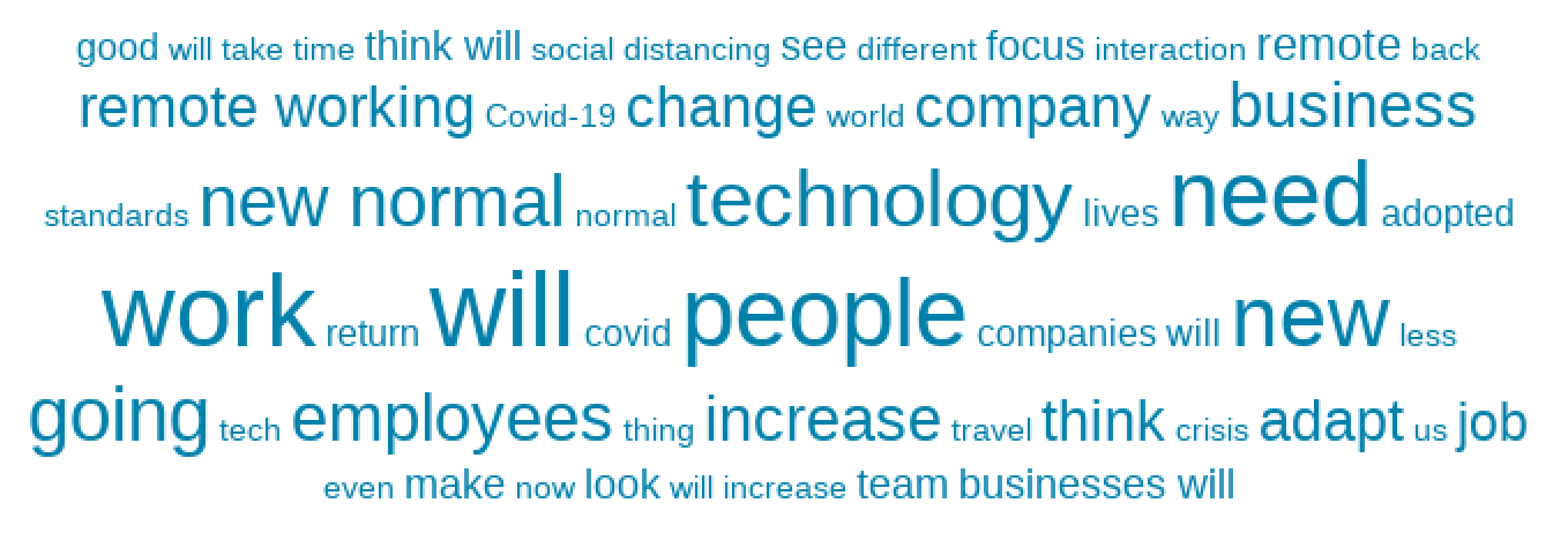New World of Work survey report: In their own words
This is a collection of open-ended responses from our New World of Work survey report which was published in August 2020. More than 350 respondents filled out the 30-question survey, resulting in numerous compelling insights both for business and recruitment interests. Many added their own commentary in the “Other” category in several questions, and 91 offered final thoughts at the end of the survey – more than one in four.

Note: All responses are verbatim. Edits have been restricted to punctuation, spelling, and capitalization for reasons of legibility.
Obstacles to remote work
In response to the question, “Of your workforce that can’t go remote without disruption to workflow, what’s stopping them?”, logistical challenges and willingness to work from home were common refrains:
- “Not having the space for working at home uninterrupted.” (Marketing, US & Canada, HR Manager/Director, <50 FTEs)
- “Some don’t have a great setup at home – some people are struggling emotionally from isolation, WiFi, comfortable workspace, noise, family, living in small spaces.” (Healthcare, Middle East & Africa, Service/Support Manager/Director, <50 FTEs)
- “Remote working is very much a personal thing. The office is a controlled environment. Home is very different for different people.“ (Staffing/Recruiting, UK & Ireland, Recruitment Manager/Director, <50 FTEs)
- “No space at home to work remotely.” (IT/Tech, US & Canada, HR Individual Contributor, 50-99 FTEs)
- “They prefer to work from the offices.” (Education, Multinational, Product VP/SVP, <50 FTEs)
- “They do not want to work remotely.“ (IT/Tech, Multinational, Office Administration Manager/Director, <50 FTEs)
The value of being physically together in a workspace also came up:
- “There is still value in being present. We are a route-based business and some staff must still report to the physical location. We want to avoid creating a disparity between job roles.” (Landscaping, US & Canada, Owner/Executive, <50 FTEs)
- “Lack of team work experience/stand-ups, spontaneous interactions, etc.” (IT/Tech, Multinational, Manager/Director, <50 FTEs)
- “The fact that we’re solving very tough problems and we believe in people having a chance to discuss how to solve them.” (IT/Tech, Continental Europe, HR Individual Contributor, <50 FTEs)
- “Easier to collaborate in the office.” (IT/Tech, Multinational, HR Individual Contributor, 50-99 FTEs)
- “We like being together.” (Accounting/Finance, US & Canada, Office Administration Entry Level, <50 FTEs)
And overall lack of buy-in, especially among management, was a major sticking point:
- “We could offer all our team remote working, but it won’t work for us.” (IT/Tech, UK & Ireland, HR Individual Contributor, <50 FTEs)
- “Employer not in full support of remote work/flexi-work.” (Accounting/Finance, Middle East & Africa, HR Manager/Director, 50-99 FTEs)
- “Mindset of leaders who cannot trust people working from home.” (Accounting/Finance, Continental Europe, Manager/Director, 500-999 FTEs)
- “Managers not really happy with having people in full remote.” (IT/Tech, Continental Europe, HR Individual Contributor, <50 FTEs)
- “CEO does not like it.” (IT/Tech, Multinational, self-described sole Talent Manager reporting to CEO, <50 FTEs)
- “Managerial trust.” (Salon, US & Canada, Operations Manager/Director, 50-99 FTEs)
- “Team leads want their teams to be physically in the office saying that it’s more effective.” (Accounting/Finance, Continental Europe, HR Entry Level, <50 FTEs)
- “CEO opinion on WFH.” (Consulting/Business Services, US & Canada, HR Individual Contributor, 50-99 FTEs)
Hiring challenges during COVID-19
In response to the question, “If your business is continuing to hire during the COVID-19 crisis, what are the top three biggest challenges in filling job positions?”, the following challenges were cited:
- “Candidates unable to apply for visas/permits due to a temporary freeze from certain countries (in this case Switzerland).” (Publishing, Multinational, Recruitment Entry Level, 100-499 FTEs)
- “Difficult to find qualified engineers.” (IT/Tech, Americas, HR Manager/Director, <50 FTEs)
- “Small talent pool of profiles we are looking for.” (IT/Tech, Multinational, HR Executive, 100-499 FTEs)
- “Coordinating remotely with hiring teams.” (Consulting/Business Services, US & Canada, HR Manager/Director, <50 FTEs)
- “Uncertainty of permanent job location.” (Nonprofit Publishing, US & Canada, IT Support, 100-499 FTEs)
- “People extending their notice periods of termination as mutually beneficial due to economic uncertainty – thus feeding into hiring freeze.” (Education, UK & Ireland, HR Manager/Director, <50 FTEs)
- “Restrictions to travel/relocate.” (Gaming, Europe/UK & Ireland, Recruitment individual contributor, 500-999 FTEs)
- “Candidates unwilling/unable to relocate despite generous relocation offers.” (IT/Tech, Continental Europe, HR Manager/Director, 50-99 FTEs)
- “Candidates accepting the first offer they get, so we need to be quick. And passive candidates not wanting to change roles for uncertainty and new probationary periods.” (Education, Continental Europe, HR individual contributor, 100-499 FTEs)
- “Candidates not wanting to work at specific sites” (Security, US & Canada, HR Entry Level, <50 FTEs)
- “Unsure if candidates truly want to work for us, or if they are applying due to a layoff and they just want any job.” (Consumer Packaged Goods, US & Canada, HR Individual Contributor. 50-99 FTEs)
- “Initially, we had many people looking for positions as they were out of work. As more areas open up in our state, we have seen less availability. Healthcare is very busy.” (Healthcare, US & Canada, Manager/Director, <50 FTEs)
- “Not being able to hire internationally (can have temp visa holders enter Australia).” (Education, Asia, Recruitment, 1000-4,999 FTEs)
- “Reduced recruitment pool due to border restrictions.” (Science/Research, Oceania, Operations Manager/Director, 100-499 FTEs)
Hiring challenges after COVID-19
In response to the question, “If your business plans to hire in the future after the crisis passes, what do you anticipate to be the three biggest challenges in filling positions?”, diluted talent pools and hiring in a distributed fashion were listed as top challenges:
- “Candidates requesting total remote working options from countries where we don’t operate offices in.” (Publishing, Multinational, Recruitment Entry Level, 100-499 FTEs)
- “Coordinating with hiring teams remotely.” (Consulting/Business Services, US & Canada, HR Manager/Director, <50 FTEs)
- “With an increase of job-seekers, quality of candidates may lower and sifting through ‘qualified’ applicants will be time consuming.” (Facility Management, Multinational, Marketing Manager/Director, 5,000+ FTEs)
- “Increased supply of candidates but finding right/good people and not excited by all who present well but are not who they seem.” (Consulting/Business Services, Multinational, Recruitment Individual contributor, 100-499 FTEs)
- “Too many candidates for some roles, not enough in others, highly specialized high tech positions may be hard to fill.” (IT/Tech, US & Canada, HR Manager/Director, 100-499 FTEs)
- “Onsite interviews during a slow re-open process.“ (Accounting/Finance, US & Canada, HR Manager/Director, US & Canada, <50 FTEs)
Ending quotes from respondents
The most comprehensive responses were reserved for the end, with more than 90 of the 350+ adding their own insights, commentary and opinions on completion of the survey.
The question was as follows:
Any additional thoughts or comments on what you think the world of work will look like after the COVID-19 crisis? No right or wrong answers here – we just want to hear your perspective.
The overall themes were clear as seen in this word cloud generated from the responses.
Even then, the answers were broad, insightful, and varied.
The ‘New Normal’
Many respondents highlighted huge changes going forward, with “new normal” being a popular catchphrase throughout.
- “New normal, more remote work and virtual meetings, less unnecessary face to face activities.” (IT/Tech, Multinational, Service/Support Manager/Director, 500-999 FTEs)
- “More tech/digital adoption; More WFH opportunities: More need for employee engagement and employee monitoring.” (IT/Tech, Asia, Recruitment Individual Contributor, 50-99 FTEs)
- “I think that it will change a lot in the world. Adapting as we have gave us knowledge to be more flexible and change to remote working. I think many people will adapt more wellness programs and education.” (Human Services, US & Canada, HR Individual Contributor, 100-499 FTEs)
- “The new normal will change definitely our lives especially in work perspectively. We need to follow set of rules, guidelines for you to be able to move on forward.” (Healthcare, UK & Ireland, Service/Support Entry Level, <50 FTEs)
- “Businesses will hire less workforce as they adjust to the new ‘normal’. Some businesses will definitely adopt a virtual platform that will see shift in work schedules. New policies adopted should ensure that the workforce is confident in how the businesses will treat them in psychologically, professionally and financially.” (Consulting/Business Services, Multinational, Operations Manager/Director, 500-999 FTEs)
- “People are adapting to the new normal. That means, industries and businesses are going to adapt to using digital platforms to deliver their work and product. People are adjusting to social distancing and embracing the technology to meet people and make their daily earnings.” (Education, Entry Level, <50 FTEs)
- “Remote and flexible working will be the new reality.” (IT/Tech, Asia, HR Individual Contributor, 5,000+ FTEs)
- “After COVID-19 crisis, everything will change, industry, leaving environment, job opportunity in market and unemployment will increase.” (Education, Asia, Sales Owner/Executive, 500-999 FTEs)
- “Less social interaction, business travel, longer work hours.” (Energy Commodity, Multinational, HR Owner/Executive, 100-499 FTEs)
- “All of us will need to adapt to the new normal. Travel and work will be planned differently. BCP-DRP will be looked at differently.” (IT/Tech, Multinational, Engineering Manager/Director, <50 FTEs)
- “Remote working will be the new normal with great flexibility, greater international opportunities and life balance.” (Fashion, Continental Europe, Service/Support, Owner/Executive, <50 FTEs)
- “Remote jobs will increase. Companies will adapt to remote working patterns, this will be the new normal even with the invention of vaccine. As people become used to work from home, meeting physically will be only a matter of necessity.” (Consulting/Business Services, Service/Support Owner/Executive, <50 FTEs)
- “In our industry, it will never return to before COVID-19. We will need to change our focus to marketing to consumers within our own country, province or within driving distance. The visitors from around the world will be minimal. This means hospitality won’t be big employers any longer.” (Hospitality, US & Canada, HR Manager/Director, 50-99 FTEs)
- “Company headquarters will transform to be brand builders, places to develop company culture, drink the Kool-Aid, for candidates, employee training/gathering and customers. Think McDonald’s Hamburger University meets Google headquarters.” (Healthcare, Multinational, Marketing Manager/Director, 100-499 FTEs)
Some respondents highlighted the lack of clarity about the road ahead:
- “There is no standard to go off of. My company is in tech/software and it is far more about what the competition is doing than what is a good idea for our business and population. A small start-up of 60 is trying to set precedent based off of Twitter going 100% remote. That does not seem reasonable to me.” (Consulting/Business Services, US & Canada, HR Individual Contributor, 50-99 FTEs)
- “Everything is still unclear… No visibility of what tomorrow will look like…” (Logistics/Supply Chain, Middle East & Africa, Marketing Manager/Director, <50 FTEs)
- “It is a road that has not been walked, i honestly dont know what is ahead, one is only just willing to explore many different strategies, until they find one that works.” (Hospitality, Sales Manager/Director, <50 FTEs)
- “I’m not even sure. It’s scary to think that the covid will never go away and that at any given time you could run into someone who is infected but not showing any symptoms and can infect others.” (Substance Abuse Counseling, US & Canada, Senior Counselor, <50 FTEs)
A few suggested it’ll eventually return to the norm that we always knew:
- “Things will go back to normal, businesses will operate like how they used to.” (Education, Office Administration Manager/Director, <50 FTEs)
- “This time shall pass. Social distancing will end. We will all be back to being regular humans again.” (Telecommunications, US & Canada, Finance VP/SVP, <50 FTEs)
Technology becoming a necessity
The emphasis on tech as part of a company’s business continuity plan (BCP) and disaster recovery plan (DRP) was clear:
- “The world of work will be focusing on new technology to make work efficient and boost collaboration in virtual ways, more adaptive to remote working style, the expenses for office rental, travelling will be cut as well, more creative ways in employee engagement events.” (Healthcare, US & Canada, HR Individual Contributor, <50 FTEs)
- “Asian work environment was still very much conventional where employees are expected to be in office. Covid-19 has shown the Asian business owners that weak link where they refused to even contemplate a more modern outtake in workplace practice (i.e. have flexi-working arrangement, therefore reduce office space or have office suites), being penny wise but pound foolish when it comes to technology adoption. During the shutdown, those who spent on technology was able to be ‘business as usual’ where workforce worked 100% remotely.” (IT/Tech, Asia, Operations Manager/Director, <50 FTEs)
- “It will have to be very flexible and open to new and unprecedented measures in allowing productivity to flow despite the new office norms. There will be a greater need for technology and its various intents and purposes so that operations can still continue despite physical limitations. What humans or live personnel cannot do, technology should cover.” (Staffing/Recruiting, US & Canada, Recruitment Manager/Director, 50-99 FTEs)
- “Technology constantly changing and updating. Need training for new tech that changes constantly. We all work with different ideas and really don’t train to work as a team. It would be helpful if we all worked in a similar manner – using similar styles for best in class work.” (Staffing/Recruiting, US & Canada, Recruitment VP/SVP, <50 FTEs)
- “I think it will be vastly different dependent upon the sector. My company is in the technology sector so I expect there will be minimal disruption to productivity and team engagement (if the past few months are any indication) but other sectors that are not so conversant with technology may have a much more challenging experience in shifting to new models of work.” (IT/Tech, UK & Ireland, HR Manager/Director, <50 FTEs)
- “Innovation cycles in our (conservative – mechanical engineering) will be faster, customers are more used to digital technologies and will ask for that, e.g. IoT.” (IT/Tech, Multinational, Manager/Director, <50 FTEs)
Challenges are unique and varied
Managing a business through this time and in the future had challenges specific to industry:
- “Universities’ revenue model has to change. Will people be more inclined to become self-employed?” (Entertainment and Telecommunications, Multinational, HR Individual Contributor, 5,000+ FTEs)
- “Hopefully more UK manufacturing as reliance on manufacturing from abroad has been a huge issue.” (Staffing/Recruiting, UK & Ireland, Recruitment Manager/Director, <50 FTEs)
- “Working in a preschool environment, we found it challenging to meet the needs of our families remotely. We were able to deliver a quality educational experience, but families really missed the childcare component of our program. They are not interested in a remote alternative to preschool and would accept it only as an emergency measure.” (Education, US & Canada, Office Administration Manager/Director, <50 FTEs)
Logistics and operations were affected as well:
- “It’s difficult to enforce policies that aren’t government mandated, like mask wearing, to non-employees, such as drivers coming to the warehouse. Then a decision has to be made to refuse that person into the building and potentially delay customer orders? The variety of how much people care on an individual level makes it impossible to modify everyone’s behavior the same way.” (E-commerce/Online Store, US & Canada, Operations Manager/Director, 50-999 FTEs)
- “In our region, we struggle with our labor legislation – more employers are looking at new ways of working and that impacts every aspect of our work , from remote teamwork to sales and customer service, critical cloud infrastructure and security. We need to be 100% focused on keeping our employees safe and serving our customers the best way we can ever be.” (Food Industry, LATAM, HR Manager/Director, 500-999 FTEs)
- “I guess my only anxieties are: When we partially reopen the office how much everyone will stick to the new rules we’ll need to have about hygiene. When we partially reopen the office if will this impact presenteeism (i.e. my boss has gone in today so I feel I should go in even if I don’t feel safe, or have to take a busy underground train, etc.)” (IT/Tech, Multinational, HR Manager/Director, <50 FTEs)
- “Overall, adjust of employees to the new normal will be a challenge. As once in the office, most of them will easily forget the distance measures or to continuously wash hands. But looking forward to have operations and sales increase, having Clients confidence.” (Consulting/Business Services, Multinational, Sales Manager/Director, 100-499 FTEs)
And sadly for some, the challenges were insurmountable:
- “This is all so sad. Very very unnecessary. I lost my business because of a dishonest political agenda.” (Education, US & Canada, Office Administration Manager/Director, <50 FTEs)
- “It has completely destroyed a business that I have worked 38 yrs to build. I do not see how I am going to be able to stay in business with the new guidelines.” (Education, US & Canada, Office Administration Executive, <50 FTEs)
It’s not just about business
For many, the crisis has a political or social component to it:
- “It feels like the politicization of the pandemic can’t be avoided. if you wear a mask or insist on 6ft distancing, some people treat you differently. this is a much larger issue obviously, but the lack of empathy for immunocompromised/at risk individuals is sad, and it’s hard to empathize for those who think I’m brainwashed by the CDC, WHO, etc.” (IT/Tech, Multinational, Service/Support Individual Contributor, 500-999 FTEs)
- “Instead of thinking it is a post-COVID, we need to think that this is the balanced and readily available economy. Gap between rich and poor has to come to a point where both can meet. Only poor feeds the rich.” (Hospitality, Middle East & Africa, Finance Manager/Director, 100-499 FTEs)
- “More remote working. Increased tech. Increased tracking. Less personal contact. More depression and mental health issues. The phrase ‘New Normal’ was thought up by Communist China. I wish these phrases were not adopted along with assuming everything is all new. Critical thinking is key as is compassion and kindness. Adopting new slogans and so forth sweeps people along but at a cost.” (Consulting/Business Services, multinational, Recruitment Individual Contributor, 100-499 FTEs)
The human factor
People are at the core of the crisis and its impact on business, and many respondents were quick to highlight the changes in how colleagues approached their work – and how that fit into their personal lives:
- “Workers will care a lot more about their loved ones than ever before; work will be secondary…” (Staffing/Recruitment, multinational, Recruitment Executive, <50 FTEs)
- “There will be more focus on the person rather on what the person produces. Companies will start asking why people do what they do before asking them to just do their job.” (Education, LATAM, HR Entry level, 50-99 FTEs)
- “Basically this Covid has made us realize that people can work remotely with the same efficiency and giving extra time to their family as well. So we can keep or introduce a few new policies in our company where each of the employees can get an opportunity to work from home for particular week or days, which will make them more happy as their willing to spend time with their family will be fulfilled during their work.” (IT/Tech, Asia, HR Executive, 50-99 FTEs)
- “On the positive side: People will be more aware of self and growth which will lead career stability and as an organization attrition can be controlled. On the other side: there may not be enough opportunities for those who are laid off – as most of the work would be automated or virtual. We need to create more jobs … that is something which will take time.” (Consulting/Business Services, Asia, Recruitment Manager/Director, 50-99 FTEs)
- “I have been amazed at how well our team have adapted to working from home. We have all acknowledged that we miss the team interaction, but I really feel we’ve got to know each other more, we’ve had daily calls since the lockdown, which has helped our split site company (some on Isle of Man, rest in London) I think it will take time to accept the new normal, but we will get there. My feelings about travel certainly feel different, I live on the Isle of Man, but travel to London to see our team there, and I don’t feel comfortable being on a busy tube right now, so I think it will all just take time. I hope that we take all the learnings we’ve acquired during this lockdown and bring these forward. Our air is clearer, our seas are cleaner, we recognise the importance of being connected after being so isolated for so long, we appreciate the small exercise time we’ve had outdoors. The world will be different, but so much potential to be better too.” (IT/Tech, UK & Ireland, HR Individual Contributor, <50 FTEs)
- “New life and new way of living is happening now, the most important is to adapt and find the right way to work and to improve.” (Retail, Middle East & Africa, HR, Individual Contributor, 100-499 FTEs)
- “It’s very ambiguous how the world of work will look like after the COVID-19 crisis. What I’d like to see though, is to make adjustments which benefit employees and define new standards which will make employees feel safe. There are so many things going on around us as a covid-19 effect, that make mental health quite fragile. And this is something very crucial we should focus on.” (IT/Tech, Multinational, Marketing Manager/Director, 100-499 FTEs)
- “It’s going to look very different without a doubt. However, we are a resilient species and will adapt to this like we did other situations. Personally, I think it will be good for us, we were starting to lose focus of who we were, it was becoming less important to talk to people face to face and more important to stare at phones. People are now more aware than ever about the importance of family and friends, and less people will take that for granted. Yes, we will be using technology more in our day to day lives due to Covid-19, but now we are focusing more on what’s actually important.” (Mining/Exploration, Oceania, Operations Manager/Director, <50 FTEs)





